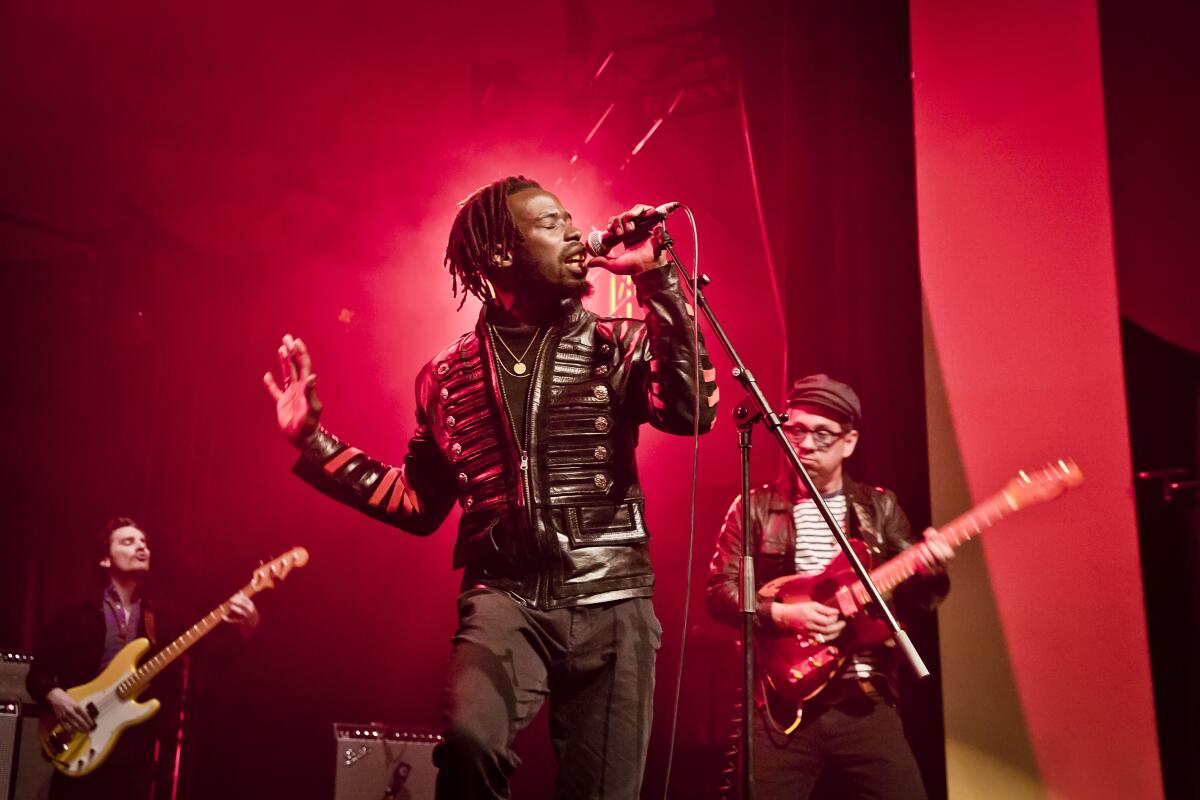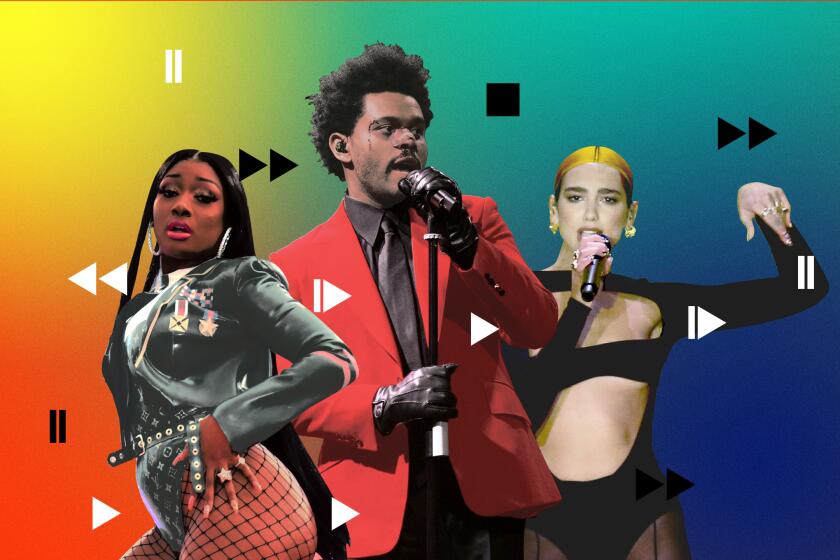How did Black Pumas go from busking to Grammy faves? Practice, sure, and the right song
- Share via
The same headline fired up the internet last year when the Grammy Award nominations were announced. Eric Burton and Adrian Quesada know exactly which one.
“Who are the Black Pumas, right? Where’d they come from?” Burton says, with Quesada nodding in his own square on Zoom last week.
They get it. As a soul-funk duo based in Texas, in just two years they had catapulted from Austin’s favorite party band with a breakneck tour schedule to a Grammy contender in one of the top four races.
From Fiona Apple to Yves Tumor and a head-spinning assortment of artists and genres in between, these are, alphabetically ordered, our favorite songs of 2020.
Black Pumas were the dark horse when they scored a nomination for best new artist alongside heavyweights Billie Eilish, Lizzo and Lil Nas X. Eilish won, but Burton and Quesada landed a consolation prize this year: three more Grammy nominations for 2021’s ceremony, including album of the year for their self-titled debut’s deluxe edition, plus nods for the song “Colors” in the record and American roots performance categories.
No one should be surprised, though. Black Pumas are red meat for Grammy voters: edgy yet polished, toeing the line between retro and modern in a way that the Recording Academy loves to reward. (See: Adele, Alabama Shakes.) Their mashup of soul, funk, blues, hip-hop and rock has a psychedelic sheen, prompting KCRW to christen their sound “Wu-Tang Clan meets James Brown.”

Burton, 30, anchors the group as its singer and songwriter; Quesada, 43, colors its palette as producer, guitarist and band director.
“I think half of the success of Pumas was that we started as a studio project. We were just recording, and, honestly, if none of this [success] had ever happened, Eric and I might still be working on music every couple weeks for fun,” Quesada says. “But I think it really took on its own life when we started performing live.”

Quesada, a seasoned musician who has played with Prince and Daniel Johnston and in the bands Grupo Fantasma and Brownout, was looking for a collaborator in 2017 to work on his instrumental demos. A mutual friend suggested he reach out to Burton, and a cursory Google search left him floored. “He was instantly the most compelling musician I had never met,” Quesada says.
They connected over email, then a quick phone call where Burton sang for Quesada, and finally hammered out a day in the studio that felt alchemical enough to warrant another one. And then another one.
Beyoncé garnered nine Grammy nominations to lead all artists. Taylor Swift, Dua Lipa and Roddy Ricch each received six. The Weeknd was conspicuously shut out.
Burton imbues Quesada’s crisp melodies with a cosmic, Southern California vibe. He grew up in Van Nuys, dabbling in musical theater in high school and college before honing his stage craft with that most thankless of gigs: as a street performer busking on Santa Monica Pier (and later downtown Austin) for a few years.
“That was definitely an education,” Burton says, and it forged a conviction in him that has guided the band since the beginning. Early on, they played a corporate event at South by Southwest that could have been disastrous in a room full of unassuming lawyers.
“They hired us to come play, and Adrian tells me, ‘Hey, man, don’t take it personally, but these people are not going to pay attention. They’re not going to listen to us,’” Burton says. “I said, ‘Well, the hell with that. For as hungry as I am to do this, they’re going to pay attention to me and listen to me.’ I think at that point I was able to integrate the independence that I learned in busking.”
“He was in the crowd and running from table to table,” Quesada remembers of Burton’s performance. “All of a sudden, even for those stiff attendees, it turned into a little bit of a mini party. That’s inspired me to be better on stage because that’s never been my forte. My forte has been more in the studio and my production mind. I think that has really brought out the best in me — being on stage with him. You can’t sleepwalk through this, man, not with Eric.”

The pair exude an easy chemistry that’s palpable particularly to the bandmates who flesh out their songs as a muscular live ensemble.
“Everybody’s individual shine gets combined in this band to create this picture you see and these emotions you feel in the songs,” says Angela Miller, who adds texture to the music as a backing vocalist along with Lauren Cervantes.
ATO Records, which released Black Pumas’ debut and then its deluxe edition, was savvy enough to capitalize on the duo’s higher profile after last year’s Grammy nomination.
Released over the summer, the deluxe edition added 11 bonus tracks of new material, live versions and covers. This time out, though, the label rallied behind “Colors,” a simmering ballad whose pastoral imagery belies a potent message about embracing unity and diversity in a fractured world.
Jon Salter, ATO’s general manager, says both editions of Black Pumas’ debut album were submitted for Grammy consideration, including album of the year, but he suspects last year’s exposure earned Black Pumas even more fans within the Recording Academy.
“For this period, ‘Colors’ was our focus. It was really about getting that song, which is a big song with a big message especially for right now, to the next level,” he says. “We were really caught off guard by the album of the year nomination, but it makes sense. Grammy voters are finally connecting with these guys.”
More to Read
The biggest entertainment stories
Get our big stories about Hollywood, film, television, music, arts, culture and more right in your inbox as soon as they publish.
You may occasionally receive promotional content from the Los Angeles Times.












